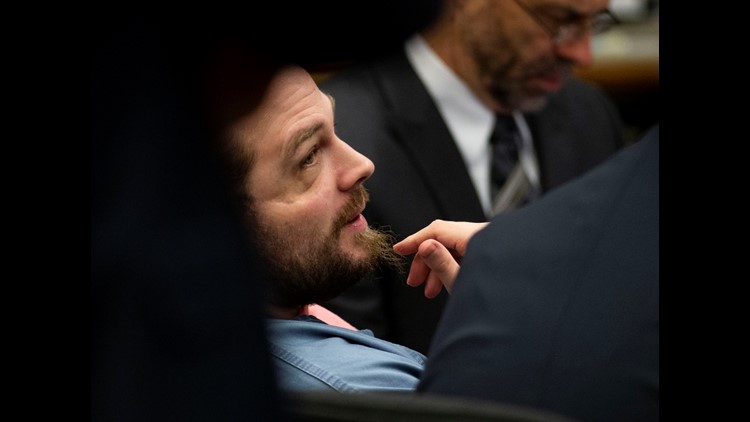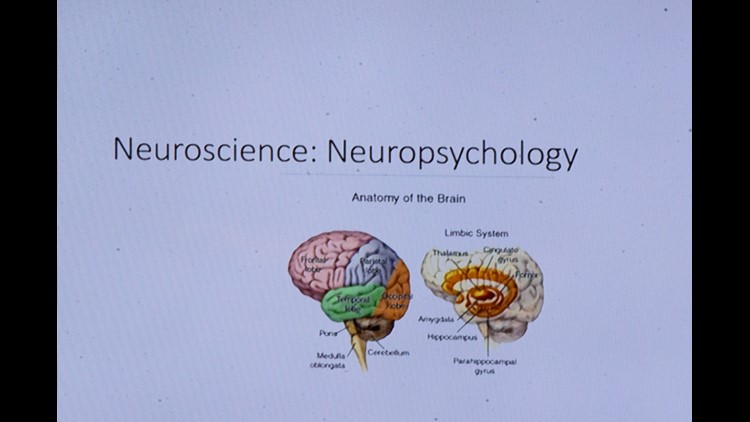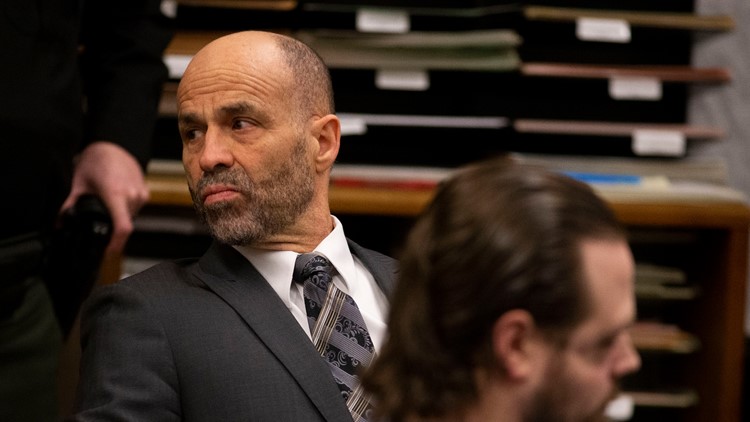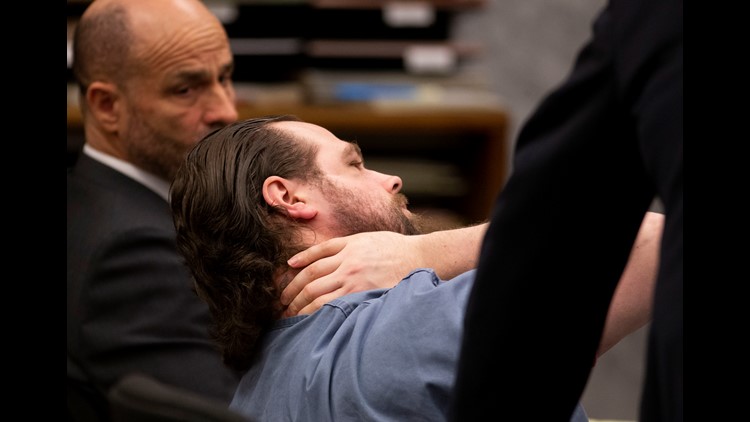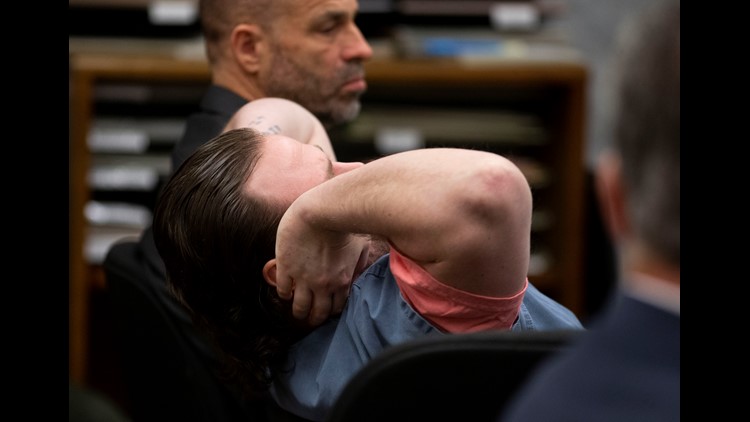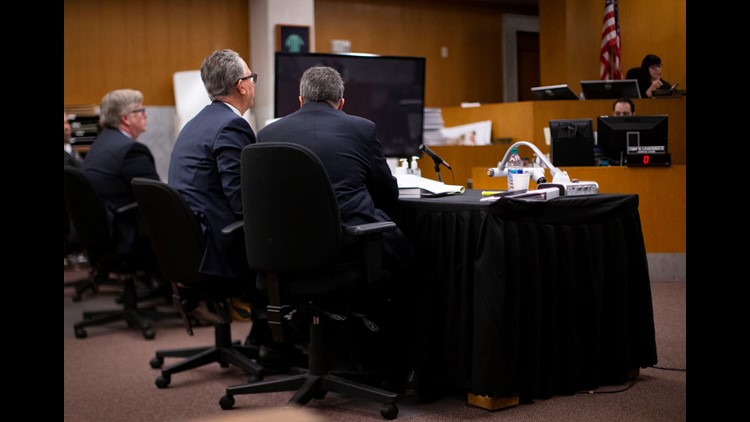PORTLAND, Ore. — The defense team for Jeremy Christian, the man accused of stabbing three men aboard a MAX train, continued its case Tuesday by bringing in a forensic psychologist who testified he diagnosed Christian with autism spectrum disorder.
However, that same expert said ASD "cannot fully account for or explain his behavior on the MAX train."
Christian is accused of going on a hateful rant aimed at two black teen girls aboard that TriMet MAX train on May 26, 2017. An altercation followed between Christian and two other men, Micah Fletcher and Taliesin Namkai-Meche, and quickly escalated.
Prosecutors say Christian took a 4-inch knife from the pocket of his shorts and stabbed Fletcher, Namkai-Meche and another passenger, Ricky Best. Best and Namkai-Meche died. Fletcher was gravely wounded, but survived. The knife barely missed a main artery that would have killed him.
Tuesday, clinical neuropsychologist Dr. Glena Lynne Andrews testified, saying she was asked to evaluate whether Christian had prenatal exposure to alcohol, whether a shooting to the face when he was younger affected his cognitive functioning, and about his cognitive function overall.
She said she met Christian on three separate occasions, two of which happened on the same day.
"Jeremy has executive functioning dysfunction. His frontal lobes and how his brain works to make decisions to function in the world, to assess surroundings is not where we’d expect it to be," Dr. Andrews said.
She said Christian's intellect levels overall were normal, but said there are areas he struggles more than most people.
"When I ask him to define words, he does fine. When I ask him to compare and contrast words and tell me similarities, he’s unable to do that in a normal range. He knows how to define words but doesn’t know how those words are related as they become more abstract," she said.
Referencing the 11 to 12 seconds it took for Christian to stab three men, the defense asked Dr. Andrews if that amount of time is enough for Christian to process the decisions he's made.
"No," she answered. "He's not a multi-tasker, he can’t think of two things at the same time and he can’t do two things at the same time."
Dr. Andrews also testified it does not appear as though Christian's mother had used drugs or alcohol while being pregnant with Christian. She said Christian has an IQ of 98, which is classified as average.
In a cross-examination, prosecutor Jeff Howes drilled down on cognitive test scores Dr. Andrews gave to Christian during her examinations.
His scores for most tests Dr. Andrews gave him fell into an "average" scale, aside from a handful of tests where he scored a low-average or below average, compared to his peers.
Howes asked Dr. Andrews whether these results were "remarkable." She answered the results were normal. Howes then asked Dr. Andrews if she was aware the scope of the trial encompasses "more than" just 10 to 12 seconds of an event, another reference to the time it took Christian to stab three men.
Dr. Andrews was told by the judge not to answer the question. Dr. Andrews added Christian tends to fixate on what he thinks is the correct response, and even when he got feedback he didn’t seem to be able to correct it.
In tracing back Christian's life, Dr. Andrews said elementary school records for Christian have been destroyed, and he only made it to ninth grade before he dropped out of school, despite having good grades.
However, he got his GED and went to community college -- a fact Howes said shows Christian's ability to function in the outside world. Christian also spent 4 years working at a Portland pizza shop.
PHOTOS: Jeremy Christian Trial, Day 9
Next, forensic psychologist Dr. Timothy Derning took the stand, and said Christian has a complicated and dysfunctional family history. He testified he diagnosed Christian with autism spectrum disorder, and said Christian isn't good at "intricate parts" of social dialogue.
"He bulldozes you with stuff," Dr. Derning said.
Referencing the time Christian spent in prison after a robbery, Dr. Derning called him a "damaged person."
This was followed by prosecutor Don Rees' cross-examination. Rees read through claims in Dr. Derning's report on Christian.
"You write, 'autism spectrum disorder cannot fully account for or explain [Christian's] behavior on the MAX train … [there are] other factors at play, including drinking alcohol or perhaps any other drugs, or being in prison, or possibly having a PTSD flash back,'" Rees said.
Dr. Derning confirmed that report, and added he did not diagnose Christian with PTSD, bipolar disorder or schizophrenia.
Testimony of Dr. Derning will continue Wednesday.
Both doctors admitted they had trouble getting background on Christian. Two of his three brothers refused to be interviewed, and Christian's elementary school records have been destroyed.
The state had already presented evidence and witnesses for seven days over the previous two weeks, and will have a chance to respond once the defense wraps up its case.
KGW is told closing arguments could happen as soon as next Tuesday.





